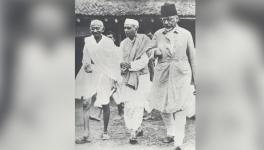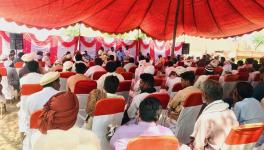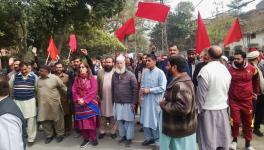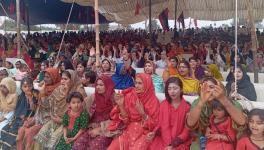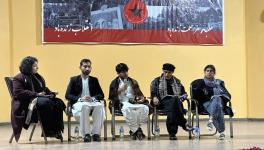Pakistani Feminist Comedians Challenge Taboos
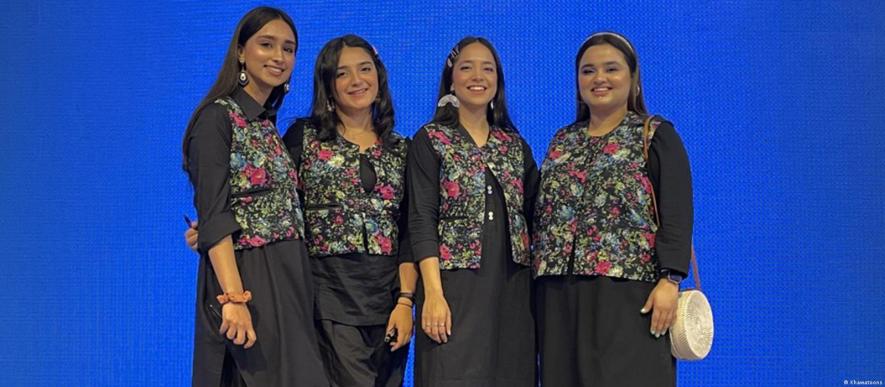
Periods, sex, body shaming, harassment, misogyny, dating: These are not topics of discussion that are openly discussed in Pakistani households or amongst friends.
But packaged as comedy, the taboo themes elicit raucous laughter and cheers in packed auditoriums. Families, couples and young people all come in droves to watch female comedians perform.
While it is becoming more common, stand-up comedy, particularly for women performers, is still a novelty.
Historically, comedy is a very male-dominated field in the country, and the rare female performers were limited to television.
Those doing stand-up comedy have until recently not been able to find acceptance in Pakistan, as there are several negative connotations and social stigma regarding women being on stage, alone and unaccompanied.
While singers such as Noor Jehan have long been a staple of Pakistani pop culture, female comedians do not occupy the same space. In Pakistani culture, women have typically been seen as subjects of jokes, not the ones telling them.
However, with the advent of more stand-up and improv comedians in the last decade, women, too, have now carved out a niche for themselves in comedy.
'Safety in numbers': Comedy troupes and social media
Several of these comedians say that they found the confidence and skills to do comedy publicly thanks to the safety they felt in all-women comedy troupes.
Amtul Baweja, 31, digital content creator and comedian, has been performing since 2011 when she was a university student, but she didn't feel comfortable doing comedy until she joined South Asia's first all-female improv-comedy group, The Khawatoons, in 2016.
"My confidence boosted performing with women. Before comedy felt very male-dominated, and automatically men would take the funnier roles or the audience would find the man funnier and make the woman feel like she was trying too hard," Baweja told DW. "But with the troupe we had to play all the roles, even the male roles, and got so many laughs."
The Khawatoons was started by one of Pakistan's best-known comedians, Faiza Saleem.
She started the troupe so women could have a safe space to express themselves freely and be able "to talk about difficult things through comedy," Saleem told DW.
Baweja and Saleem not only share being in the same troupe together, but both have launched very successful careers as comedians, leveraging the power and reach of social media as well — the former has 47,000 followers on Instagram and the latter, 178,000. Both social media and being in female troupes allows these women freedom and safety, they say.
Robina Ahmed, 64, is a retired government official who started doing stand-up comedy four years ago. She, too, found artistic refuge in another Pakistani feminist stand-up troupe, Auratnaak, after mostly performing in comedy groups with "young guys," where she did not feel as free to explore the issues she wanted to.
Challenging patriarchy through humor
Ahmed broke further barriers recently by performing an entire solo set to a sold-out hall the day after her retirement.
"Comedy for me is a sugar-coated pill which is bitter but easier to swallow. I mainly deal with issues related to women in my acts. Patriarchy, misogyny, taboos, emotional abuse, gender identity, sexual preferences are some of the topics I usually raise in my sets," Ahmed told DW.
Ahmed does all this and more in Punjabi, the native language of the Punjabi people in the Punjab region of Pakistan, which adds uniqueness and authenticity to her sets.
In her solo show, Ahmed pushes many patriarchal boundaries to a diverse audience, detailing how social constructs imposed a lack of bodily autonomy in her life from youth to adulthood.
"I speak about things I have experienced in life. I never ever talk about hypothetical things or situations. I think this makes my expression more genuine and convincing," said Ahmed.

The Khawatoons are South Asia's first all-women improv troupe
Challenging another taboo, she also shares how she only realized in her 60s that her gender identity was nonbinary.
In an act of overt feminism, Ahmed also undoes her bra underneath her clothes on stage, symbolically dismantling patriarchy's hold on her.
As Baweja says: "We are reclaiming space. Even if one isn't even talking about women's issues, just being brave enough to stand up and speak is feminist. You are contributing to representation and equality."
Amna Baig, 30, is a police officer in the country's capital, Islamabad, and has been doing stand-up for the past three years.
Baig occupies two male-dominated fields, police and comedy, and uses comedy to elucidate the stereotypes and sexism inherent in the police force and society as a whole.
However, her main aim is to destigmatize and demystify her profession as a policewoman: "By humanizing the police through my sets, I try and change the people's perceptions about them. So that when they need some help, they don't think twice before approaching the police and that more women feel comfortable to join the police as workers, too," said Baig.
The future of feminist comedy in Pakistan
While these women are a testament to the talent brimming in the country and a growing interest in female comedians' work, many barriers remain for women cementing their career in comedy on a full-time basis.
"Over the past 10 years I've seen a lot of female comedians online, social media, improv and stand-up, but we still have a long way to go. Many women don't pursue it as a profession, as there is not enough scope for it, but I hope in the future, this will change," said Saleem.
She added that unlike their Indian counterparts that have hit international success and recognition, owing in large part to OTT platforms such as Netflix commissioning shows, it is unlikely women comedians in Pakistan will have similar opportunities, as they are restricted by "social and religious factors."
Ahmed is optimistic: "I see the comedy scene dominated by women in the near future. They are intelligent and witty, they pick up the right issues and they know how to show a mirror to society."
Edited by: Elizabeth Grenier
Get the latest reports & analysis with people's perspective on Protests, movements & deep analytical videos, discussions of the current affairs in your Telegram app. Subscribe to NewsClick's Telegram channel & get Real-Time updates on stories, as they get published on our website.













